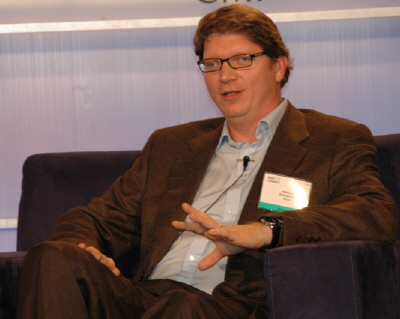More from the Web 2.0 Summit

Yesterday's Web 2.0 Summit included a few highlights worth mentioning. Elinor Mills covered Skype co-founder Niklas Zennstrom's chat with John Battelle, Skype plans to offer bloggers and others the ability to hold audio chats in the next version of it service.
The next version of Skype will enable people to post a link on a blog or Web site that will take people to a public chat room when clicked on, he said during a question-and-answer session during dinner.The live chats would be "Skypecasts," which Zennstrom described as public conversations or audio conferences that people can moderate. He would not provide a timeline for the features except to say it would be "soon." Meanwhile, Skype has had conversations with many social-networking sites about offering services that would allow users to "share content with each other in a conversation," he said.

Zennstrom also briefly touched on two Skype-backed projects, FON and the The Venice Project. "FON could become the largest public Wi-Fi network," he said, and the Venice Project will take the best of TV and puts it on the Net, not just the short, low-quality video clips. He also said that Skype revenues will be close to $200 million for this year, up from $60 million the previous year.
Martin Lamonica posted about John Battelle's conversation with Barry Diller of IAC and Arthur Sulzberger, chairman of the New York Times Co. On the subject of user-generated or amateur content, Sulzberger said that the NYT plans to embrace content produced by the masses, but with caution. "We are looking at information gathering by amateurs, if you will, that we trust. Because at the end of the day, we're putting our name on that work, and finding the right balance is hard work."
"It doesn’t matter how you present the journalism--paper or electronic. It is the quality of editing and reporting that is important," Sulzberger said (pictured below).
Diller came up with his usual memorable comments. He agreed with Sulzberger that "editorship" is not going aways and that "everyone would like to believe that their entrails are of great interest to everybody, but it's just probably not so."
Martin also covered a panel that discussed the hurdles standing in the way social networking applications. For businesses, many of the social networking tools are not industrial grade, and for consumers Web users are stuck in silos.
Despite ongoing attempts to establish single sign-on standards, Web surfers typically are not able to log on to several sites at once, such as booking an airline ticket from United Airlines and then renting a car from Hertz.
Marc Canter, the CEO of Broadband Mechanics, wants end users to have the ability to control their profiles.
End users are asking for the ability to have a master profile so that they can keep data in one place and can update it. They want to move their data and feel like they are in charge of their data.